Getting ready to fly? Read these important rules before you head to the airport to make sure you're cleared for air travel during the COVID-19 pandemic.
13 Air Travel Rules You Should Know Before Flying During the Pandemic
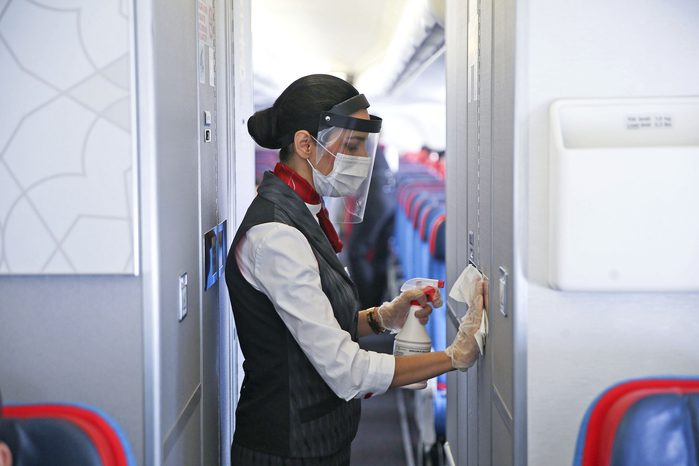
Expect the unexpected
If there’s anything that living through a multiyear pandemic has shown us, it’s to expect the unexpected when it comes to air travel with COVID-19. New variants seem to be continually developing—and impacting all aspects of modern life. COVID-19 affects air travel regardless of whether you’re flying one state away or around the world, and as a result, airplane travel rules are constantly changing. What seems fine one day can pivot at a moment’s notice, especially where travel warnings about country restrictions, mask mandates, and COVID-19 testing are concerned.
The good news—yes, there is some—is that we now have vaccines (and boosters) to protect us while traveling. And airlines have evolved in the past two years, and they’re finding ways to keep passengers healthy while traveling and offer some flexibility with ticket changes and cancellations (something we never could have said about pre–COVID-19 air travel).
If you’re planning on air travel during COVID-19, your best course of action—beyond getting vaccinated and wearing a mask—is to arm yourself with knowledge. By learning what you can’t do on airplanes anymore and the things flight attendants can’t do anymore, you can safeguard your health and the health of others. In that spirit, here are the travel rules you need to know to easily navigate the airport, speed through airport security, and fly during the pandemic.
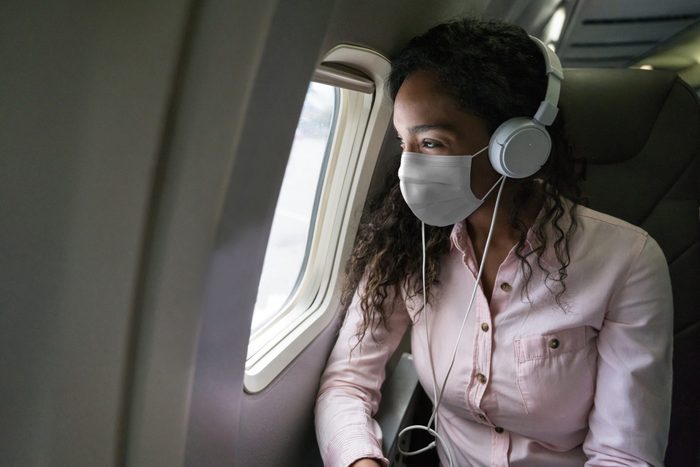
Wear a face mask
Yup, we know: Wearing a mask can sometimes feel restrictive. But masks work to stop the spread of highly contagious variants, especially in crowded locations like airplane cabins. Their positives greatly outweigh our desire to ditch them. Wearing a face masks not only protects you and your co-passengers, but also the countless airport staff and flight attendants working through COVID 19 for you. More important, it’s not just a good idea to wear a mask on a plane—it’s also the law. According to the Centers for Disease Control and Prevention, “Wearing a mask over your nose and mouth is required in indoor areas of public transportation (including airplanes) traveling into, within, or out of the United States and indoors in U.S. transportation hubs (including airports).”
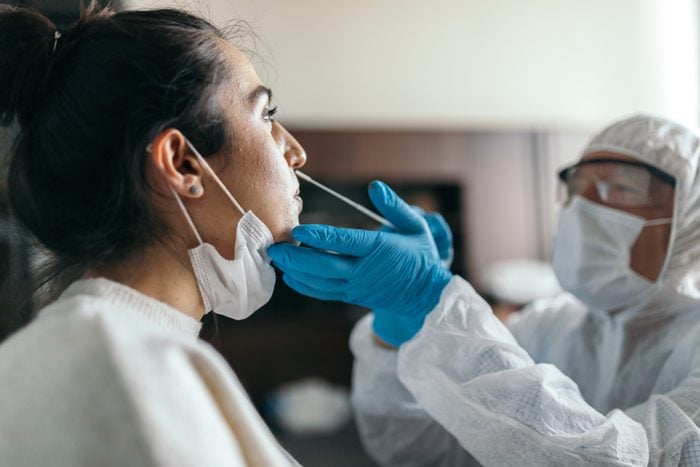
Get tested within a day of flying in from abroad
If you haven’t flown internationally in a while, be prepared for some new rules. The latest was enacted by President Biden on Dec. 2, 2021: All airplane travelers flying into the United States from an international destination will now be required to show proof of a negative COVID-19 test result taken within 24 hours of departure. This rule applies to everyone, regardless of vaccination status or holiday plans. While it’s quick and easy to test, it will take some advance planning to make sure you meet the timing requirement. And be sure to have a backup plan should you test positive and find yourself unable to leave your destination. While you’re at it, find out which in-flight things flight attendants wouldn’t do—and you shouldn’t do either.

Change or cancel your flight without fees
One upside of the pandemic? Airlines won’t wallop you with fees if you change your flight. In the early stages of the pandemic, in a bid to win back customers uneasy about taking to the skies, United Airlines, Delta Airlines, and American Airlines announced that they would no longer charge customers to change their tickets, and other airlines followed suit. (Previously, the fee had been $200 for domestic tickets and for some short-haul international flights, and no airlines would bend their rules.) The no-fee change has stayed throughout the pandemic, making it easy to move your flight if you’re not feeling well, are nervous about air travel during COVID-19, or, quite honestly, just want to change your plans. It’s one pandemic change we’re happy to see stick around.
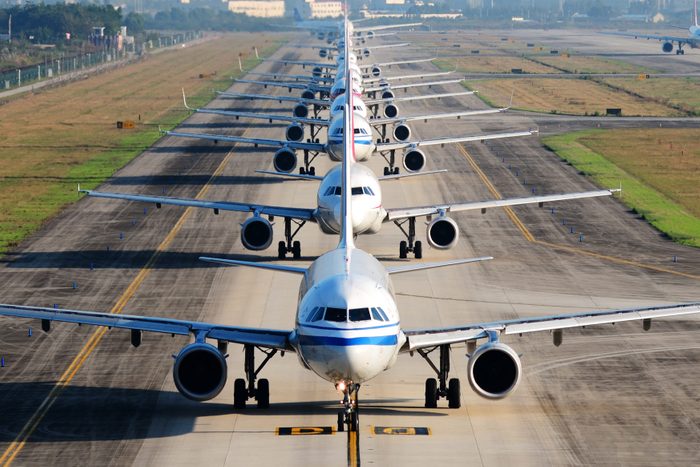
Track travel bans regularly
After the Omicron variant was discovered by researchers in South Africa in November 2021, the United States imposed travel restrictions on the following countries:
- South Africa
- Botswana
- Zimbabwe
- Namibia
- Lesotho
- Eswatini
- Mozambique
- Malawi.
Residents of these countries weren’t the only ones who were barred from entry into the United States. If you visited any of those countries as part of a larger itinerary, you were not be able to enter the United States for two weeks.
However, on December 31, 2021, President Biden rescinded the ban, and residents and travelers passing through those countries became eligible to enter the U.S. again.
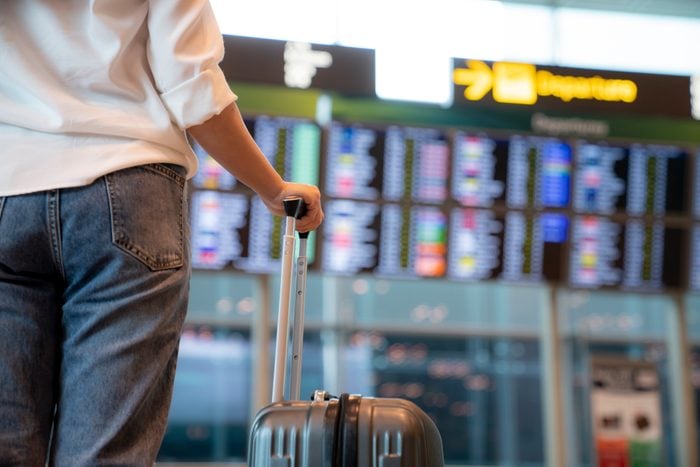
Don’t fly to these countries
A number of countries throughout the world currently require visitors to present negative COVID-19 tests or show proof of vaccination to enter. But there are two nations that are prohibiting tourists regardless of their statuses or vaccinations. Japan and Morocco are not currently allowing any foreign visitors. Israel had closed its borders to all foreign tourists in late November 2021, but recently announced that, starting January 9, 2022, it would reopen its borders to vaccinated and recovered non-Israeli tourists. Before you book your flight, be sure you know the best day to buy airline tickets.
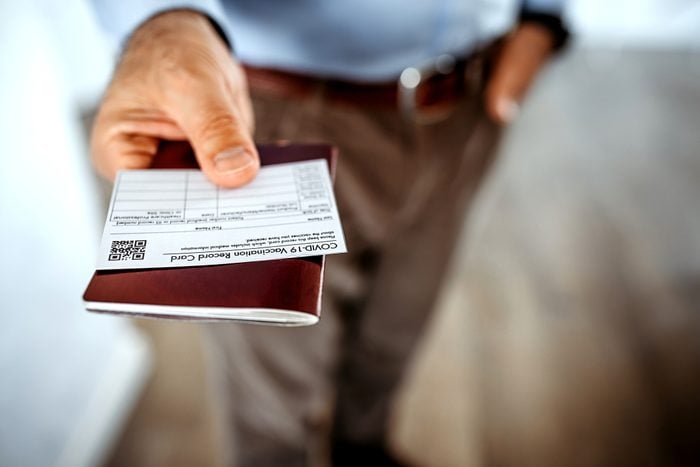
Present proof of vaccination or a negative COVID-19 test
Most countries are open to U.S. visitors—with caveats. In most of the Caribbean, you’ll need to show a negative COVID-19 test to enter. In South America, countries like Ecuador require proof of vaccination, while Belize and others have a negative testing requirement. One exception is Mexico, which has no testing requirements. You’ll still need a negative test to return to the United States, though. In Europe, there are numerous rules about vaccination status and COVID-19 testing. To avoid hassles, find out what your destination country requires before you hop on that airplane. United Airlines has a handy map that makes sorting through requirements easy. And if you’re wondering, is the pandemic over? Here’s what experts have to say.
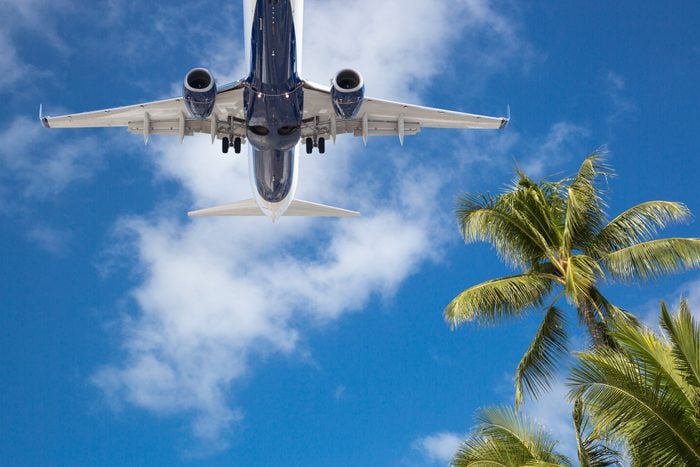
Follow travel restrictions for Hawaii
It’s not just foreign travel that has mandatory COVID-19 testing requirements. The state of Hawaii has stringent procedures in place too. Before you fly to the Aloha State, you’ll need to create an account with Hawaii’s Safe Travel platform or another approved digital option, such as CLEAR, an airport prescreening tool. Be sure to set it up prior to departure, then upload proof of vaccination or a negative result from a Hawaii Trusted Testing Partner. Follow the rules, and once you arrive, you can hit the beach or island-hop without issue. Don’t test or vaccinate, and you’ll be in a 14-day quarantine.
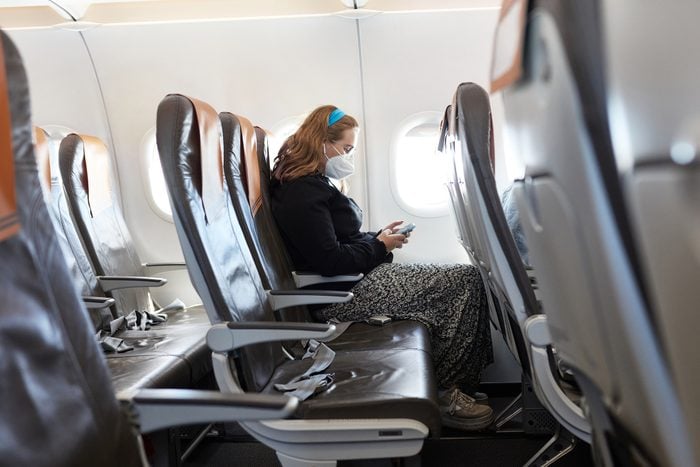
Follow the airline’s safety rules or risk being banned
It’s not necessarily a mandate that a passenger will be banned from flying if they don’t follow masking rules, but there is a precedent for it, and it’s certainly a viable option. In fact, since the beginning of the pandemic, Delta Airlines has banned more than 1,600 passengers for unruly behavior and breaking COVID-19 rules, and it’s trying to persuade other airlines to share banned lists to create a national “No Fly” roster.
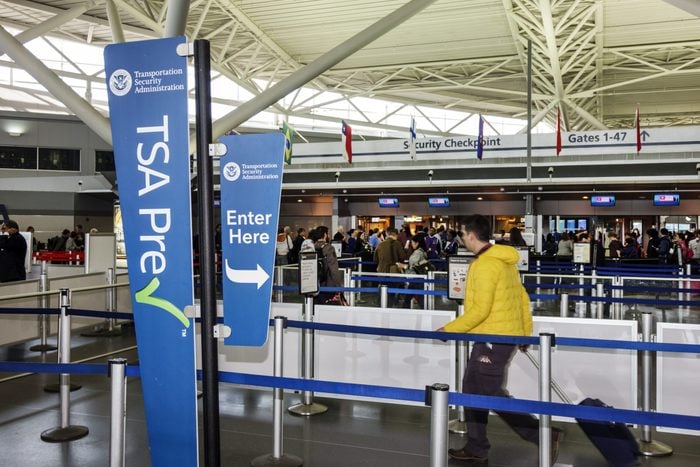
Get unruly, and you could lose your TSA Pre-Check
The Transportation Security Administration (TSA) recently announced that “unruly airline passengers may face additional consequences for bad behavior” under a new partnership between the Federal Aviation Administration (FAA) and the TSA. Under the partnership, the FAA will share information about passengers facing fines for unruly behavior, which can then result in the removal of the flagged passenger from the TSA Pre-Check program, which is reserved for “low-risk” travelers.
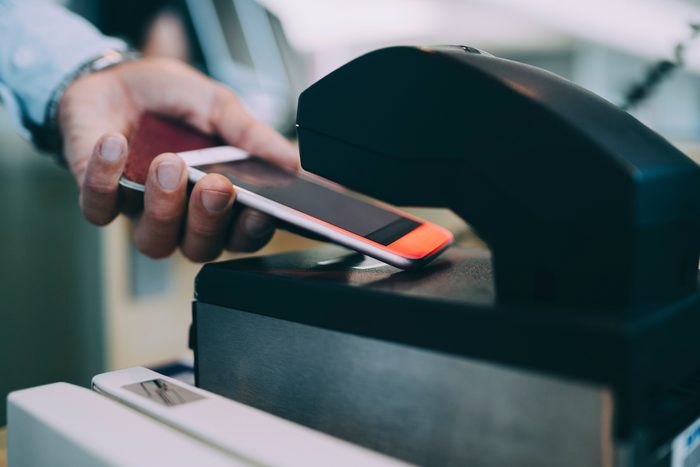
Don’t hand over your ticket
One thing that may catch your attention as you board your flight or go through security: You’ll be asked to scan your boarding pass yourself. This eliminates a point of contact between passengers and the gate agent. And if you want to avoid other points of contact in the airport, you can consider CLEAR, a touchless paid ID service that scans your eyes and speeds you through security. It can also be used with TSA Pre-Check, which means you can keep your shoes and jacket on and avoid touching high-contact points too. As some things continue to go back to normal, learn about things you won’t see in airports anymore.
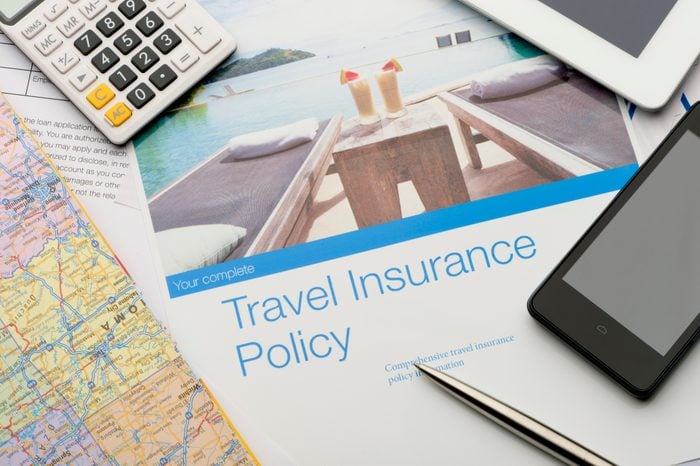
Purchase travel insurance
According to SquareMouth, a travel insurance comparison engine, the company has insured 300 percent more travelers than last year and 70 percent more than in 2019. “Interest and awareness surrounding travel insurance is at an all-time high,” says Megan Moncrief, chief marketing officer for SquareMouth. “Travelers are preparing differently this year by opting for travel insurance to protect themselves in case travel plans are affected by unpredictable events, from cancellations to illnesses.” Not only does travel insurance give you peace of mind, but in some destinations it’s mandatory. For example, the Bahamas, Anguilla, and Bermuda won’t allow visitors to enter without a health plan that will help repatriate them in the case they contract COVID-19. Some countries have their own policies, which you’re required to purchase to visit, so check before you buy a plan.
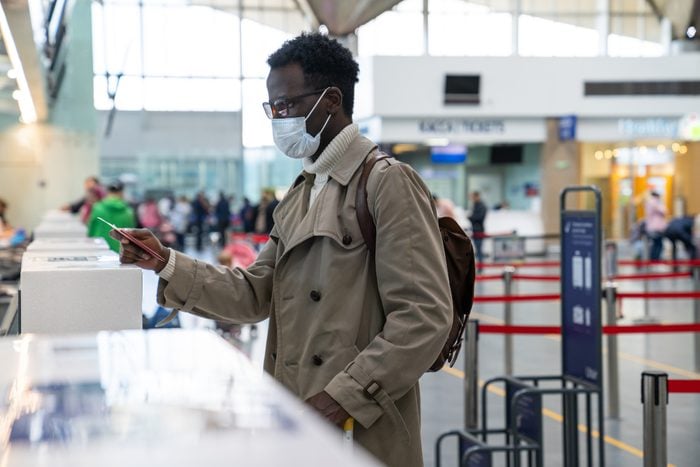
Don’t worry about a REAL ID—the deadline has been delayed
Pre-pandemic, the TSA was getting ready to roll out a new security policy that required travelers to have a REAL ID–compliant license by Oct. 1, 2021. Due to the influx of issues surrounding this initiative, including DMV and government office closures, the deadline has been pushed out—way out—to May 3, 2023. The official statement says, “Due to circumstances resulting from the COVID-19 pandemic, the Department of Homeland Security has extended the REAL ID enforcement deadline.” For now, you can continue to use your government-issued driver’s license (or a passport) for ID purposes when flying, but beginning May 3, 2023, every air traveler 18 years of age and older will need a REAL ID–compliant driver’s license, state-issued enhanced driver’s license, or another acceptable form of ID to fly within the United States.
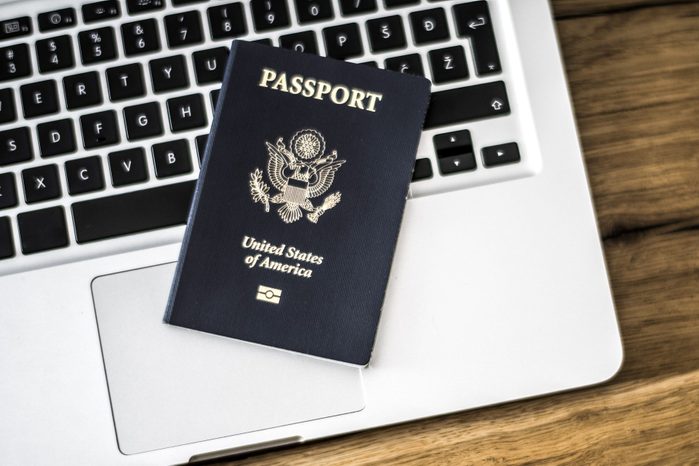
Renew your passport digitally
Here’s a big pandemic plus: The White House just announced an initiative to make a number of everyday government interactions easier, including passport renewal. On Dec. 15, 2021, the president directed the State Department to create a paperless online passport renewal that won’t require any physical documents to be mailed. The rollout date hasn’t been set yet, but frequent travelers are excited about the ease with which they’ll be able to get new documents, especially when considering air travel with COVID-19. While you’re gearing up for your next post-pandemic trip, learn how you can benefit from a digital nomad visa.
Sources:
- Megan Moncrief, chief marketing officer for SquareMouth
- Centers for Disease Control and Prevention: “U.S Citizens, U.S. Nationals, U.S. Lawful Permanent Residents, and Immigrants: Travel to and from the United States”
- The Hawaiian Islands: “Travel Requirements”
- Delta: “Memos reflect Delta’s commitment to employee and passenger safety”
- Transportation Security Administration: “Identification”
